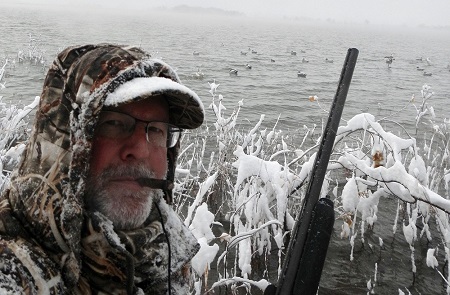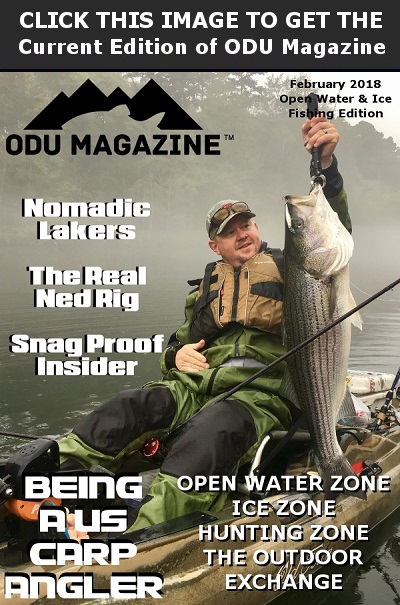
I work in conservation because I love our lands, waters, fish and wildlife.
I am a sportsman.
When I think about the incredible opportunities I have in America to fish and hunt on public lands and waters, I feel strong, proud and grateful. But protecting what I – and tens of millions of other sportsmen and women around the country – value isn’t easy.
Yet it should be.
So when the Theodore Roosevelt Conservation Partnership (TRCP) asked me to be part of a panel reviewing the Trump administration’s first year of conservation at the 2018 SHOT Show last month, I gladly agreed to speak in front of representatives from across the shooting and hunting industry. After all, this industry relies on healthy habitat, clean water and vast public lands, and supports wildlife conservation through excise taxes and investment.
It’s a symbiotic relationship where a healthy environment drives economic gain, fueling opportunity, access and large and small businesses. These basic values and tenants emerged during the SHOT Show panel, including the current threats to sporting values and wildlife health that continue to grow at a pace that should concern all sportsmen and women. Read on for an overview of what the panel discussed, focused on public lands policies, the recent withdrawal of Clean Water Act protections to headwaters and wetlands, and restoring the Mississippi River Delta.
Public Land Access and Energy Development
Enacting policies to expand sportsman access to public lands is not just popular, it’s also critical to the future of hunting and fishing. A staggering amount of public land is landlocked, surrounded by private lands, and in many cases efforts to close easement access to these lands is ongoing. Great victories, such as the Sabinoso Wilderness effort by New Mexico Wildlife Federation (NMWF) and TRCP – working with both senators in New Mexico to garner funding and purchase private land – allowed a donation to the federal government for access to that pristine wilderness.
With hundreds of NMWF members signing a petition telling Secretary Zinke to open up this wilderness, this was a landmark example of what happens when sportsmen and women fight for their access, and was a huge victory years in the making.
Discussion turned to energy development and dominance on public lands, where energy development and mining can coexist with healthy habitat and quality hunting and angling. But this balance does not happen by chance.
Responsible energy and extraction development requires both careful planning and a commitment from decision makers to get it right from the start. It is, therefore, critical that our public land management agencies – the Bureau of Land Management and the U.S. Forest Service – have the right policies and procedures in place to facilitate both energy development and the conservation of healthy fish and wildlife populations.
Withdrawal of Clean Water Act Protections
Moving on to water issues, we touched on the EPA’s decision to withdraw Clean Water Act protections for headwaters and wetlands impacting fish, waterfowl and businesses that rely on quality places to hunt and fish.
The U.S. Army Corps of Engineers and Environmental Protection Agency have begun the process of rescinding the 2015 provision that clarified protections for headwater streams and wetlands under the Clean Water Act, despite broad public support for the rule and its benefits for fish and wildlife habitat. This is the first step in a two-step process to replace the rule, set into motion by an executive order in February 2017.
The repeal and replacement plan is likely to roll back Clean Water Act protections for a majority of the nation’s streams and wetlands, including the headwater streams that are so important for fish and game, plus millions of acres of seasonal wetlands that store flood waters and provide essential habitat for more than half of North American migratory waterfowl. Areas like the Prairie Potholes and Louisiana wetlands are at tremendous risk.
As the panel came to the end of its time, Deputy Secretary of the Interior David Bernhardt took the podium. His prepared words of admonishment were designed to minimize any panel criticism of the administration, which was disappointing in its anticipation of our healthy, but brief dialogue.
I spoke to the Deputy Secretary afterward about the place he grew up — Rifle, Colorado – and the collapse of the deer herds north of there in a place once called the “Deer Factory.” Fifteen thousand new oil and gas wells are proposed for that area in the coming years – an example he disregarded. However we shifted back to the Gulf Coast wetlands and the need for his administration to ensure that the coordination of sediment diversion project-permitting in Louisiana happens efficiently, which was something he expressed interest in supporting.
 Restoring the Mississippi River Delta
Restoring the Mississippi River Delta
It’s easy to understand getting behind restoring the Mississippi River Delta. A football field of wetlands continues to disappear every hour along the coast of Louisiana, and with those wetlands goes vital fish and waterfowl habitat.
Later that week Louisiana Governor John Bel Edwards announced the signing of a memorandum of understanding between the Louisiana Coastal Protection and Restoration Authority (CPRA) and other state and federal agencies to collaborate on permitting for the Mid-Barataria Sediment Diversion under the guidance of Trump Executive Order 13807. Located in Plaquemines Parish, the Mid-Barataria Sediment Diversion is a Louisiana Coastal Master Plan project that would direct sediment, freshwater and nutrients from the Mississippi River into nearby wetlands to build and maintain land in Louisiana’s Barataria Basin.
The Vanishing Paradise campaign was pleased to see this firm commitment to adhering to the two-year timeline for project permitting in an environmentally and legally responsible manner.
Looking Ahead
We can’t continue to simply hope our politicians on both sides of the aisle protect our public lands, waterways and wildlife. We have to hold them all accountable every day, or the opportunities that drive our sporting legacy, heritage and businesses will disappear.
At every turn, our fundamental values are being challenged – in some cases on a grand scale, and others by a thousand small cuts. Access and opportunity rely on robust public lands that allow wildlife and people to move freely. They rely on clean water, clean air and healthy soil. We shouldn’t have to continually fight for these basic tenants, but instead spend our energy addressing other critical challenges impacting our wildlife.
